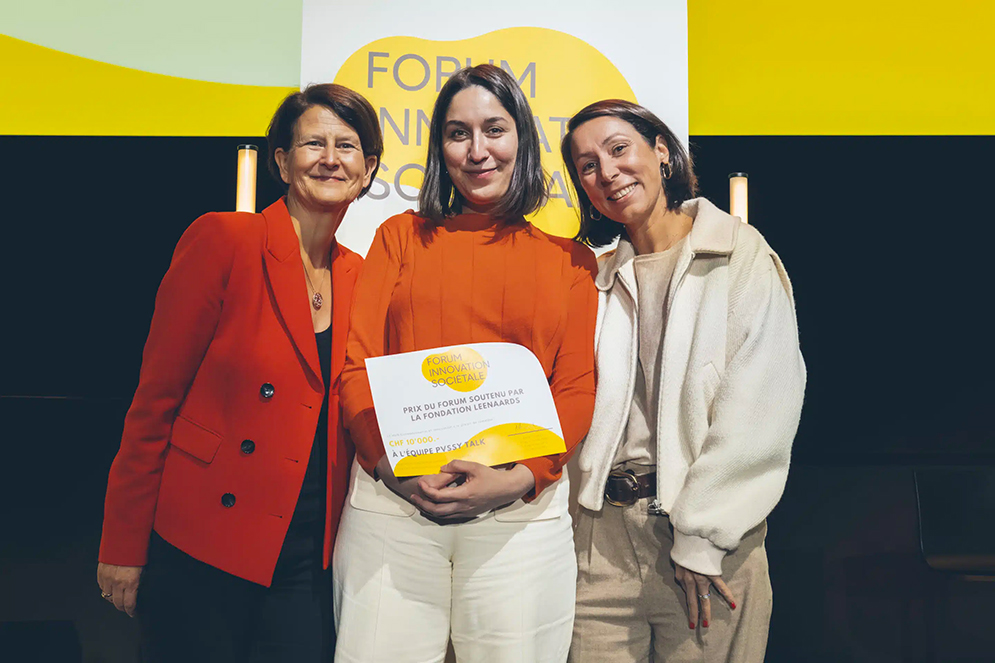Can you tell us about the Pvssy Talk concept?
Pvssy Talk s an online platform that enables women and people with vulvas to get information about their sexual pain, such as vaginismus, endometriosis, vulvodynia, and a whole range of sexual pain affecting the vulva, the vestibule and right up to the uterus, or even more.
How did this project come about?
In 2017, I was studying for a Bachelor’s degree in Visual Communication at HEAD – Genève and I became interested in the issue of medical mistreatment of patients, particularly those suffering from sexual pain. As a graphic designer, it got me thinking about a solution that could be useful for patients. So I came up with this idea, which was originally an app and is now a website, as well as an Instagram page in order to reach a different audience.
What have your studies at HEAD – Genève brought you?
My training as a graphic designer facilitated several stages of the project: getting a better overall view, thinking about the concept from the user’s perspective and easily understanding the needs for creating a website and a visual identity.
The project was incubated by Pulse Incubateur HES. What are the advantages of this kind of support?
It enabled me to launch the project and gain access to a network, via both the people at Pulse Incubateur HES and the other initiators of projects incubated at the same time as mine. Thanks to them, I've been able to meet people who have joined the Pvssy Talk team.
Pulse was also a great help in developing communication, publicizing the project, having access to experts, for example in legislation and administration, and so developing the project in areas that I was less familiar with.
There are other websites that deal with these subjects. How can you stand out?
There is already relevant and interesting content on sex education, particularly on social networks. It gave me pause for thought at first, but I was given a lot of encouragement to give it a go. What's special about the Pvssy Talk platform is that it doesn't focus on just one type of pain, but deals with different types of pain that aren't talked about much or that are still taboo or under-diagnosed. What's more, we chose to focus on Switzerland: we offer solutions and specialists in Switzerland and neighbouring France.
Who are your partners, in terms of resources and finance?
I'm surrounded by various people who support me and are involved in the project. In particular, there's a team of psychologists, sexologists, psychotraumatologists and doctors.
To develop Pvssy Talk, I did some fundraising, which enabled me to pay each person who took part in the project. There's also a donation system: people can help fund the project, which will make it possible to finance new articles on other types of pain that we haven't yet covered, due to a lack of resources.
You have been awarded the Social Innovation Forum Prize and 10,000 CHF from the Fondation Leenaards. What does this mean to you?
It's very encouraging and rewarding to receive such a prize. I started this project in 2017 and have been working for it professionally since 2021. It's a long-term project and sometimes there can be dips in energy and more difficult times, because the financial issue often comes up. Being awarded a prize like this gives you a boost, gives you renewed energy and makes you feel that the project is relevant.
Do you receive feedback from web users?
We do receive a lot of feedback, often positive. We receive constructive comments on the content, which we pass on to the healthcare professionals’ team. This feedback is very important, especially from patients who express their feelings and experiences.
We may also receive more negative comments, particularly about our choice to use inclusive language, because sexual pain concerns as much cisgender as trans and non-binary people. Not everyone likes it. It's hard to take, but unfortunately that's the way social networks are.
And what about professionals?
The medical community has given us very positive and encouraging feedback, which is very rewarding. At first, there was a fair amount of mistrust, and I got a lot of questions about the purpose of my project. But the aim is not to widen the gap between the medical profession and patients, but on the contrary to understand each other and communicate well.
We're working with a young team of doctors and we're seeing a change in the discourse, in the terms they use and the way they position themselves. They listen differently and we feel that this younger generation will pay more attention to patients, take more account of their pain and believe them - because that's a problem at the moment - with more benevolence.
What are the next developments for the platform?
We'd like to continue developing articles on other types of pain, and we're still looking for some funding. So far we've been focusing more on patients and their needs, by producing accessible content. For the future, we'd also like to change things in terms of training for healthcare professionals, and research
